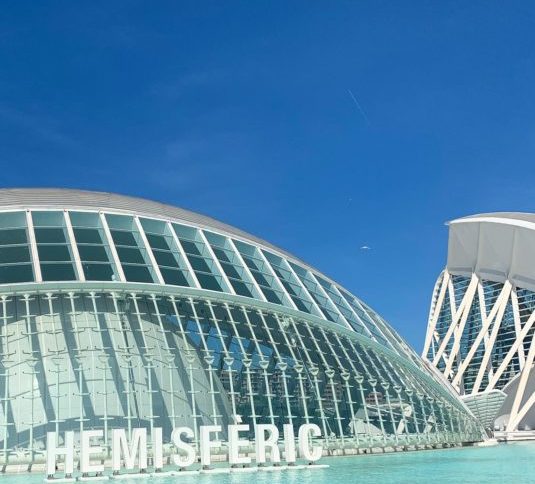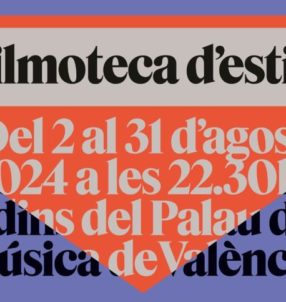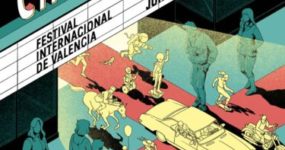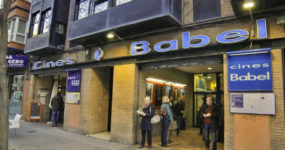##Showing at ‘L’Hemisferic’ in ‘The City of Arts and Sciences’ of Valencia, ‘Secrets Of The Universe’ is an award-winning film that aims to “inspire the inner scientist in everyone”. Narrator and lead character, renowned physicist Manuel Calderon De La Barca Sanchez gives ’24/7 Valencia’ an exclusive interview.
EXCLUSIVE ’24/7 VALENCIA’ INTERVIEW WITH PHYSICIST MANUEL CALDERON DE LA BARCA SANCHEZ
24/7 Valencia: I had the opportunity to watch Secrets Of The Universe at L’Hemisferic in Valencia, Spain. How does it feel to know your film is reaching people across the globe?
Physicist Manuel Calderon De La Barca Sanchez:That is one of the things that excited me the most about making a film like ‘Secrets of the Universe’: being able to reach, not just a broad audience, but a global audience. One of the goals we had is to transmit excitement & interest for Science in general (and Physics in particular) to a general population and specifically to children. Getting children excited about atoms, quarks, neutron stars and the universe is something very near and dear to my heart. When I have had the opportunity to be present at a screening and I hear the reaction from kids, who ask some of the best questions about the film, and I get to see the excitement in their faces, it makes me extremely happy!
Have you ever visited the City of Arts and Science, here in Valencia?
Yes! I visited Valencia a few days in 2017, with my wife and our niece. We walked around the City of Arts and Sciences; there were sculptures on the esplanade with the large pool/fountain. We didn’t go inside, so I have wanted to return. We have been talking with some of the venues where Secrets of the Universe is playing in order to hold live Q&A events with the audience, and I would very much like to do one in Valencia.
Is there a specific Scientist throughout history that you look up towards the most?
There are many! When I teach Physics, I like to highlight the humans behind the Science, and this is something we did in ‘Secrets of the Universe’. I particularly like to emphasize the role of women in Physics, because the contributions of women in Science are not always appreciated, and the access that women had to Science has been fraught with obstacles throughout history and many of those biases persist to this day. Today in my Nuclear Physics class, I was discussing on of my heroes: Maria Goeppert Mayer. She was the 2nd woman ever to win the Nobel Prize in Physics. Many people have heard of Marie Curie, who was the first one to do so (and is still the only person to win 2 Nobel Prizes in different fields, as we note in the film). But outside of Nuclear Physics, few people have heard of Maria Goeppert Mayer. She won the Nobel Prize for shedding light on the interactions going on in a nucleus, she figured out the main ingredients that we need to include in order to explain the quantum structure of the nucleus, and in doing so explained how the so called nuclear “magic numbers” come about.
These were nuclei with a number of neutrons or protons that were special, in the sense that those numbers would keep popping up in many experiments and observations. In particular, it was realized that those nuclei were particularly stable, and were relatively more abundant than others that might seem similar to them. Goeppert Mayer figured out why this was so. It is the equivalent in atomic physics of understanding why the Periodic Table looks the way it is, and why the Noble Gases are so stable. She figured out the equivalent problem in Nuclear Physics. And yet, she did not have an easy time finding a faculty position! One of the best, brightest minds in Physics had to fight against the biases in our society. The fact that there are still so few women professors, and that, up until about 5 years ago, she was also the last woman to win a Physics Nobel Prize, illustrates that there is still a lot of work that we need to do in Science in order to really give everyone a fair shot. I find her story very inspiring.
How did you feel when your team succeeded in colliding the atoms?
Every time we prepare for running collisions at the accelerator, it is exciting when the collisions happen. But it is important to know that this is the work of many. I alluded in the film to the “accelerator people” and the “detector people”, but of course in the time span of the film I can’t go into a lot of detail. What is behind those statements is that there is a huge team of people who work at CERN whose job it is to get the accelerator working and to get the ions to collide. I am one of the “detector people”, where each detector team also has a huge number of people (about 3000 in the case of CMS, my experiment) that collect the collision data, analyse it, and publish the results we learn from those collisions. So for people like me, we work on getting the detector ready to collect the data, but we rely on the accelerator team to produce the collisions. So when the collisions happen, we get very excited but that is just one of the steps for us. It means we will get to do our Science, but we don’t know what we’ll see until the collisions are done and we are back in our home institute analysing the data. It is in those moments, when one of our graduate students shows us a result that I get most excited, but that is not as easy to convey in a film like this ;-). We focused on the part the collisions because that was much easier to communicate, and because that is definitely an exciting moment. Whenever a collider first achieves collisions, everyone involved celebrates! When we were visiting the Central Control Center at CERN, there is a wall that is lined up with many empty bottles of champagne; each one has a date and a milestone. The first time the LHC collided protons, for example, and another one the first time the LHC collided ions. So those are clearly moments of celebration, and so we highlighted that in the film.
Do you have any plans to create another film?
I would love to, but with the pandemic, all such projects are on hold. Stephen Low, the director of the film, talked to me about other projects he would like to do, and I was very excited. For me, any opportunity to get audiences excited about Science is high on my list. I hope that once the pandemic restrictions are eased, that we can do another film.
Plus, we still need reach more Spanish speaking audiences. Valencia is the only Spanish-speaking venue where the film has been shown so far. We planned to show it in theatres all over Latin America. I am of course particularly keen in showing it in Mexico, my native country. I also hope that can continue once the pandemic situation allows people in Latin America to return to venues where they can see ‘Secrets of the Universe’ in its full giant-screen glory.
Interview by Elizabeth Williams
Photo:L’Hemisferic, Photo Copyright: @elizabethlauren95 // 24/7 Valencia
Article copyright 24/7 Valencia
More info: https://www.cac.es/en/hemisferic/proyecciones/pelicula-secrets-universe-hemisferic.html
Related Post
Leave a comment Cancel reply
This site uses Akismet to reduce spam. Learn how your comment data is processed.

























2 Comments
Holly
1st June 2021 at 10:27 amThis sounds amazing cannot wait to go watch!!
Sally
1st June 2021 at 10:28 amReally interesting!
Looking forward to watching